Every month, ScholarshipOwl conducts a survey that helps us to gain deeper insight into Gen Z’s perspectives about college, financial aid, and their future. In October, we asked students about their overall views about the value of earning a bachelor’s degree. Numerous media reports have demonstrated a drop in college enrollment; however, the students who responded to our survey overwhelmingly still feel that college is worthwhile, with 93% indicating that they feel it is highly likely or very likely that they will earn a bachelor’s degree.
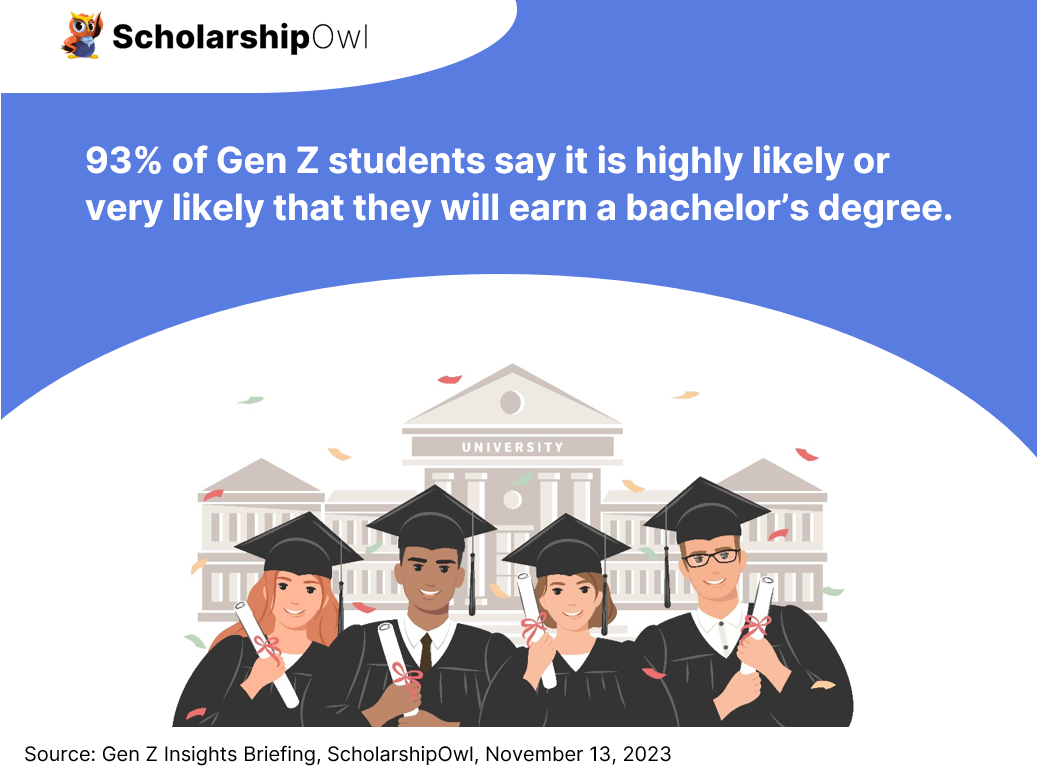
Who participated in the survey?
In October 2023, ScholarshipOwl surveyed high school and college students on the ScholarshipOwl scholarship platform to learn more about their views about the value of college. A total of 3,144 students responded.
Among the respondents, 63% were female, 36% were male, and 1% identified themselves as other. Nearly half (49%) were Caucasian, 20% were Black, 17% were Hispanic/Latino, 7% were Asian/Pacific Islander and 7% identified as other.
Win more scholarships with less effort
Simplify and focus your application process with the one-stop platform for vetted scholarships.
Check for scholarshipsMore than half (54%) of the respondents were high school students, with the vast majority high school seniors; over one-third (39%) were college undergraduate students, primarily college freshmen and college sophomores; 5% were graduate students and 2% identified themselves as adult/non-traditional students.
Survey questions
We began the survey by letting students know that recent trends show that Gen Z students are less likely to earn a bachelor’s degree than millennials, and then we asked them, “How likely is it that you will obtain a bachelor’s degree?” The overwhelming majority (93%) defied those odds by indicating that it is highly likely (78%) or very likely (15%) that they will earn a bachelor’s degree. Just 6% indicated that it is somewhat likely they will earn a bachelor’s degree, with only 1% stating that it is not likely they will earn their degree.
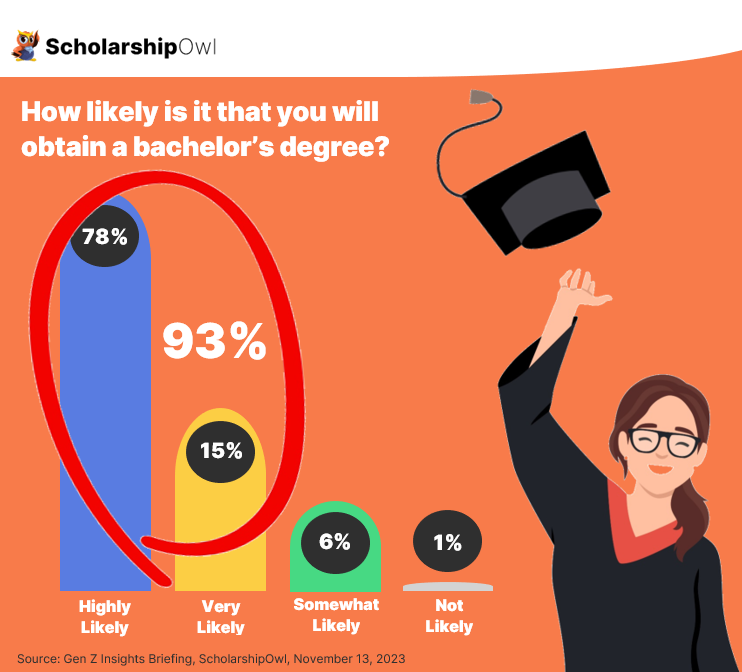
We then asked, “Which of the following most closely matches your career goal?” Nearly half of the students (48%) selected a career related to science, technology, engineering and math (STEM), with 28% selecting biological science/biomedical science/health professions/clinical science; 9% selecting engineering/architecture/environmental design; 8% selecting computer science/software development/web and app development/data science; 2% selecting geoscience/astronomy/environmental science; 1% selecting mathematics/statistics; and less than .5% selecting robotics/precision production/manufacturing. Nearly one-fifth (18%) selected a career related to business and communications, with 16% choosing business/management/marketing/entrepreneurship, and 2% selecting communications/journalism/public relations. Careers in social sciences/cultural studies were somewhat popular (16%), with 8% selecting psychology/sociology/gender studies/ethnic studies; 6% choosing political science/public administration/criminal justice/government/law/fire science; 1% selecting history/culture/archeology/world languages; and 1% selecting philosophy/religious studies/theology. Creative arts were another area that attracted Gen Z students, with 7% selecting visual arts & design/film/animation/performing arts. Careers in teaching/education were chosen by 5% of respondents, and careers in kinesiology/human performance were chosen by 4% of the students. Career areas that had minimal interest included English/literature/library science (1%); liberal arts (1%); culinary arts/hospitality (less than 1%); and construction trades/apprenticeship (less than 1%).
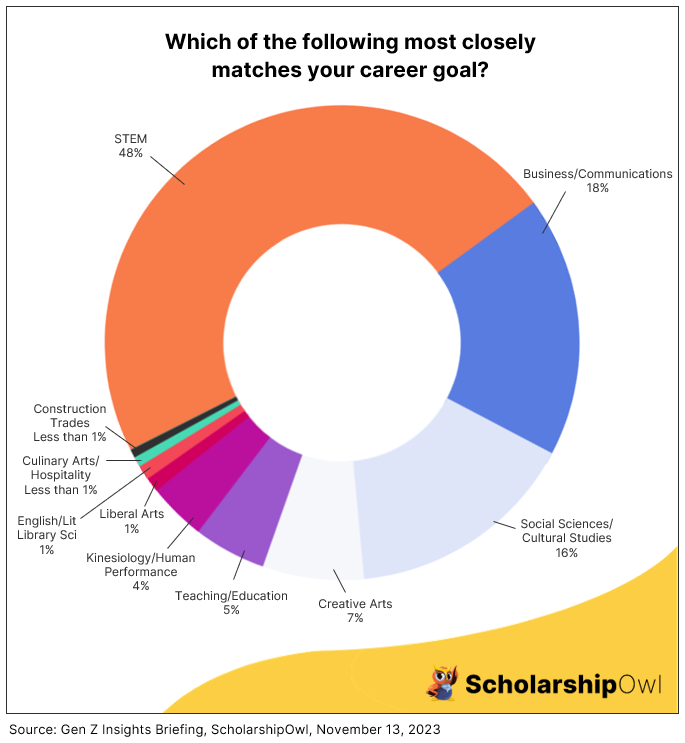
Our next question tied the value of a bachelor’s degree with a student’s career interest. We asked, “Do you feel that the time and cost of a bachelor’s degree is worth it for the career path you are pursuing?” The overwhelming majority (93%) declared that the time and cost of earning a bachelor’s degree was worthwhile for their career area; however, as expected, there were were some differences depending upon the career being pursued. The overwhelming majority of students interested in a STEM-related career, (94%) said that earning their bachelor’s degree was worth it for their field. The same was true for students interested in a career in social sciences/cultural studies (94%) as well as for students pursuing a career in kinesiology/human performance (94%). Nearly those same numbers applied to students interested in careers in business/communications (92%), liberal arts (91%), and teaching/education (90%). More than three-quarters (86%) of students interested in creative arts careers felt that a degree in their field would be valuable, and even for students pursuing careers in construction trades, over two-thirds (68%) felt a degree would be worthwhile.
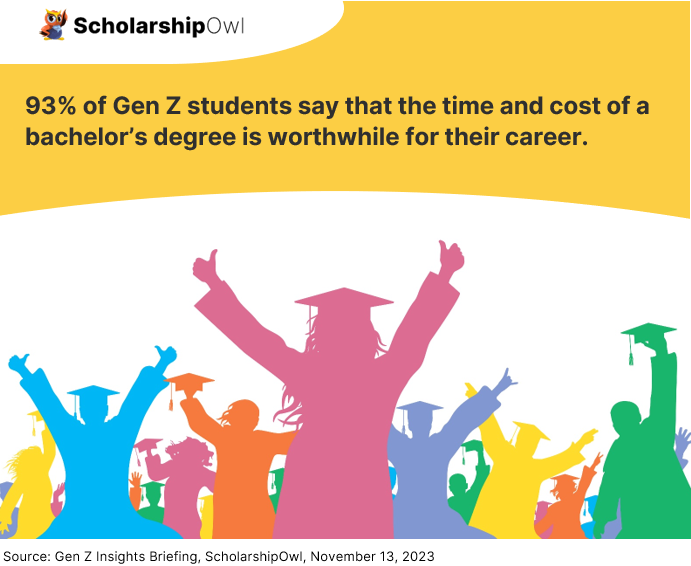
The final question asked, “Do you feel that you will be successful in your career even if you don’t earn a bachelor’s degree?” Here, the responses were split, with half (50%) saying that they would not be successful, and half (50%) saying they would not. As expected, these responses also related to the students’ chosen career fields. Among students pursuing STEM careers, more than half (55%) said they would not be successful without their bachelor’s degree. Among students pursuing a career in teaching education or a career in social sciences/cultural studies, nearly tw0-thirds (63% and 60% respectively) felt that they would not be successful without earning a bachelor’s degree. Just under half of the students interested in careers in kinesiology/human performance (49%), English/literature (45%), or liberal arts (44%) indicated that they would be successful without obtaining a four-year degree. Careers where the students were more confident in their ability to be successful without a degree were business/communications, creative arts, culinary arts/hospitality, and construction trades. Just over one-third of the business/communications students (36%) and less than one-third of the creative arts students (29%) felt they would be successful even without a bachelor’s degree. And only 23% of students interested in culinary arts/hospitality and 16% of students interested in construction trades felt a bachelor’s degree would be necessary for their success.
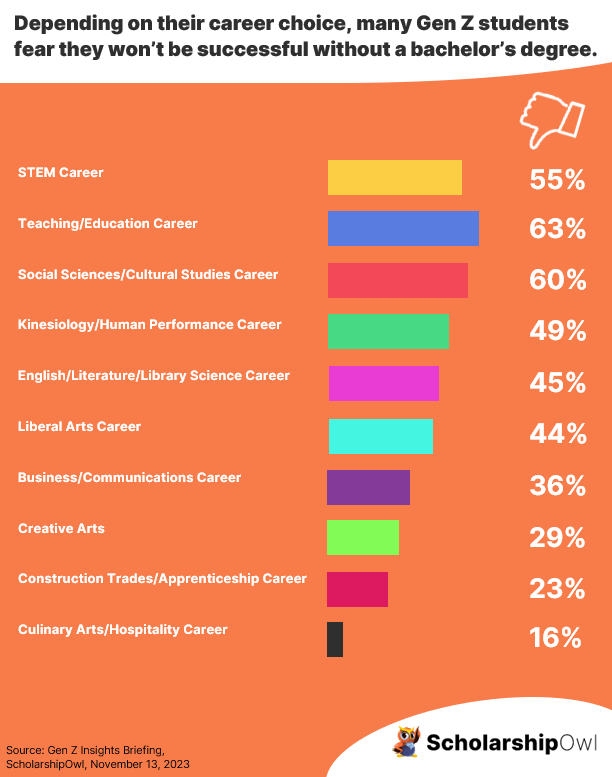
Key takeaways
Despite the media stories suggesting that Gen Z students are less interested in obtaining a bachelor’s degree, our survey found that the vast majority of students still dream of attending college – and most do pursue that path. Results also show that students are thoughtful in tailoring their academic path towards the specific career they are pursuing. For example, students interested in pursuing careers that largely require higher education, such as careers in STEM and engineering, indicated that they are more likely to complete their bachelor’s degree.
On the other hand, students pursuing creative careers, careers in business/communications, or careers in construction trades understand that a bachelor’s degree may not be as necessary to achieve success in their chosen endeavor. This also demonstrates that students are focused on ensuring that their investment in higher education will be worthwhile – they want to ensure that the cost of higher education attainment will lead to a financially lucrative and emotionally fulfilling career.
Is it possible to obtain a college education without taking out student loans?
YES! There is no need to be burdened by student debt – students can use debt-free sources to pay for college instead:
- Access federal and state grant aid by submitting the FAFSA.
- Prioritize applying for scholarships with ScholarshipOwl.
- Work part-time during the school year and full-time during breaks. Apply your earnings toward your college education.
- Choose a more affordable path to college, such as by starting at a community college.
Apply for scholarships and jobs, NOT loans, so you can graduate debt-free and start your new career with confidence!



